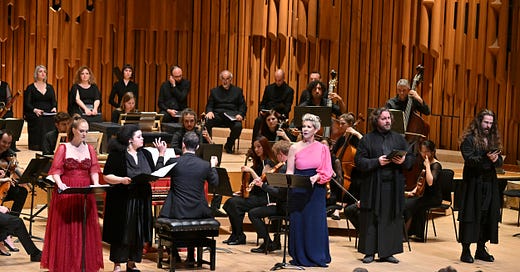A Seraphic Pinnacle of Soulful Prayer: Handel’s ‘Jephtha’ with Il Pomo d’oro, Michael Spyres and Joyce DiDonato at the Barbican
Celestial lustre stirred this oratorio courtesy of sterling singers and a primed ensemble.
From left to right: Mélissa Petit, Jasmin White, Joyce DiDonato, Michael Spyres and Cody Quattlebaum. Credit: Mark Allan/Barbican
Lulling sullenness to sleep, uplifting Jephtha – Handel’s final oratorio – extols a loveless god. When its protagonist resolves to sacrifice a life in firm exchange for his troops’ victory, he is (predictably) presented with his daughter. Stuck between this bloody obligation and a fear of losing, Jephtha grieves – but only momentarily. An angel surfaces to vow that Iphis need not perish for the Israelites’ success: virginity will be enough.
Gingerly surging over songful flights, the score deplores indictments of the deity – fêting instead the liberty of youth. At the baton of Francesco Corti last night at the Barbican baroque orchestra Il Pomo d’oro tingled with the thrill of strings’ staccatos, ominous arpeggios and portending cadences. Though Marta Gawlas’ transverse flute seemed a little muffled in her solos, Corti and fellow harpsichordist Guillaume Haldenwang intoned their Act 1, Scene 3 duet with serene auspices. Fiercely searing through the swifter passages, the strings occasionally lost cohesion but embraced a conflict between God and mortal.
Pristinely tinting notes with introspective chromas, Il Pomo d’oro’s choir echoed sentiments both heaven-borne and human – designating itself judge and confidant; priest and Greek chorus. Sopranos crafted slick staccati in the Act 1 proclamation ‘Chemosh no more we will adore’; angelic lilts were lent ‘They [Cherubims and Seraphims] ride on whirlwinds, directing the storm’ in Act 3. Incarnating archetypes from myths and legends, this kaleidoscopic chorus took turns playing ego to the solos’ ids.
Armour moored the oratorio’s hero to the call of duty in the form of Michael Spyres: a formidably commanding tenor. Valiantly attacking top notes, the performer offered freely tendered semiquaver runs and trills spectacular. Spyres decreed with alternating piousness and vulnerability – wracked both with Jephtha’s wrath against himself and against God.
Act 2, Scene 2’s ‘His mighty arm, with sudden blow’ was fortified with a crescendo on ‘Dispers’d and quell’d the haughty foe’ suggesting hubris on his part. And yet his inner battle in Scene 4’s ‘Deeper and deeper still, thy goodness, child’ submitted almost to parlando in the phrase ‘A thousand pangs that lash me into madness’ – masking ‘madness’s A and E flats in self-disdain. A glimmering appeal became his prayer in Act 3’s final plea, ‘Waft her, angels, through the skies.’ Concluding it with rising semiquavers on a wish for Iphis to ‘for ever reign’ in heaven, Spyres let pre-emptive mourning turn to hope.
Dolefully designing her maternal duty, Joyce DiDonato’s Storgè guided listeners through angst, augustness and nostalgia. A startled breath suggested imminent despair before the line ‘But ah! how trivial are a wife’s concerns when a whole nation bleeds,’ in Act 1, Scene 2. ‘And sighing wish thy dear return to liberty and lasting love’ not only held the final note of D for three bars but conjoined it to its repetition in a solemn portamento.
Long before the mother braced herself to lose an only child, the mezzo’s pitch-bends sculpted ‘As mourns the mate-forsaken dove’ with plaintive imploration. A contemplative pause divided ‘so’ and ‘good’ as Storgè listed Iphis’s innumerable virtues in her Act 2, Scene 3 aria ‘First perish thou, and perish all the world!’
Beset against her husband and beliefs, she was a woman rent asunder by conflicting loves. Select unsteadiness pinched certain high notes, nonetheless – especially in her last recitative, ‘O let me fold thee in a mother’s arms.’
Flutters uttered virtuosically throughout Mélissa Petit’s turn as Iphis. Ingeniously vocalising as the ingenue, she glossed her part in blithe vibrato and a glee invincible. Palpitations of excitement could be heard amidst the trills of her duet with Hamor, ‘These labours past, how happy we;’ melismas ran mellifluously as she planned her nuptials (‘Not cheerful day, nor spring so gay, such mighty blessings brings as peace on her triumphant wings.’) While certain top notes rang unsurely, many exited exquisitely and chirp-like. Iphis’s self-disciplining aria, ‘Happy they! this vital breath with content I shall resign’ (Act 2, Scene 4) extended a sublime high F♯ in ‘content’ and wispy deference along ‘I shall resign.’ Her sacrificial lamb was beautifully ennobled.
Equally enamoured was beau Hamor, here sung by contralto Jasmin White. Vicissitudes of attitude stormed through a voice of brass and silver in this role to capture love’s mercuriality. Duty-bound Hamor pondered on his ‘darkness and despair’ in colours cello-like – but reminiscences of his betrothed’s ‘sweet smiles’ were sanguine flutes. White’s five-bar semiquaver-run on ‘glorious’ in the Act 1, Scene 3 duet gleamed with a blissful ease, dispersing with the lightness of a levitating butterfly. Part 2’s opening recitative, ‘Glad tidings of great joy to thee,’ was dealt a vacillation of emotions ranging from coarse bellicosity to halcyon content. In this display of chivalrous ferocity the artist reigned supreme.
Bass-baritone Cody Quattlebaum refined his Zebul (Jephtha’s brother) with a palpable panache, exhibiting contrasting timbres to portray the warrior. Crisp consonants wrapped certain syllables with ‘t’s contentious and contemptuous: a diction dealt to characterise. Cavernously rounded tones honed the low E and A along ‘profane,’ the final syllables of Act 1’s aria ‘Pour forth no more unheeded pray’rs,’ with a despotic zeal. Some runs were less secure, however – including the melisma across ‘vain’ in the same aria.
Bells cast the spell of an unebbing jubilance in Anna Piroli’s Angel: a limber instrument descended for the aim of liberation. Chiming delicately through her pledge, the agile singer stretched the ornaments elastically to bring this oratorio to its (semi-)happy ending.
A symposium of prayer and pyrotechnics, Jephtha fuses venerable pursuits with vehicles for the fearless. This performance worshipped both.




